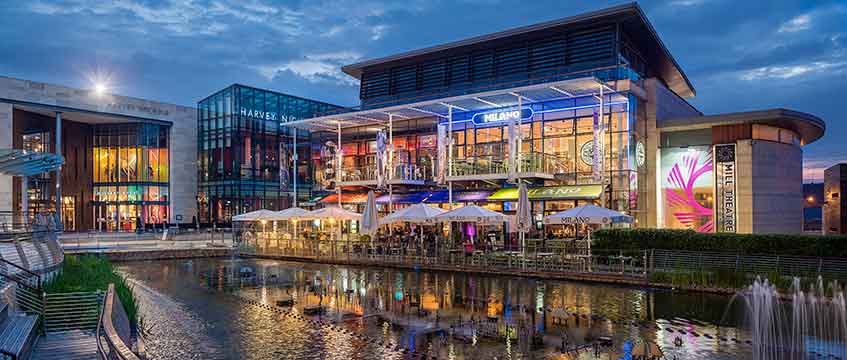A little over 18 months ago, London-listed retail REIT Hammerson spent almost £1bn buying Project Jewel, the distressed loan used to acquire some of Dublin’s biggest retail properties. This month, the developer is set to take full control of these properties in order to create Dublin’s own “Regent Street”.
Hammerson has big ambitions for Ireland. Its acquisition, with Allianz Real Estate, of the Project Jewel loan from the National Asset Management Agency for £1.4bn in September was the biggest in its history.
That acquisition gave it a 50% share, with Allianz, in the 1.5m sq ft Dundrum town centre mall and the six-acre development site next to it, a 50% stake in the 470,000 sq ft Pavilions shopping centre in Swords, north Dublin, and a 50% stake in the 291,000 sq ft Ilac centre in central Dublin.
And this month, Hammerson should assume full control of Dublin Central, a seven-acre site next door to the Ilac Centre with consent for a 1.4m sq ft mixed-use scheme. That is, of course, if former owner Chartered Land does not take up its option to buy a 50% stake and if an ongoing court case that seeks to maintain the status of a key road through the development site as a battlefield does not derail the REIT’s ambitions (see below).
Hammerson’s retail director for Ireland, Simon Betty, is steadfast in his confidence, however. He says the REIT chose to take such a risky move with the Project Jewel acquisition because it had faith that the Irish economy would recover.
“We had a high degree of confidence in the underlying property assets and economic prospects of Dublin and we were enthusiastic about the outcomes of our due diligence,” he explains. “It became about whether acquiring loans with a view to converting them into real estate ownership was appropriate for a business of our nature.”
Hammerson’s plans for Dublin Central include a complete transformation of the site, from demolishing existing buildings to re-leasing the shops, many of which are held by value retailers on temporary leases.
The scheme would court anchor tenants to open flagship stores intended to rival those on Grafton Street, Dublin’s core aspirational shopping street, and bridge the historic divide between shoppers in the north and south sides of the city.
The plans also call for mixed use development, elements of which will include office and residential. New schemes would retain their original façades in order to recreate the road’s historic function an open public boulevard.
And this is just the beginning of Hammerson’s designs across its portfolio. The adjacent Ilac Centre is already undergoing a €1.5m (£1.3m) redevelopment to create new shops, four of which have been leased to tenants including bookstore The Works and café BB’s Coffee and Muffins.
Hammerson has also appointed masterplanners FaulknerBrowns for phase two of the Dundrum Centre, Dundrum Village, which will comprise a mixed-use scheme across six acres. Although Hammerson will not commit to a timeframe for the project owing to its “complexity”, it will be office and residential led, for which the REIT is likely to consider partnerships.
Across the rest of the shopping centres Hammerson has implemented an asset management strategy aimed at attracting new international retailers. Betty says Dundrum in particular has traditionally been a gateway for retailers to break into the Irish market.
Burger chain Five Guys and retailer Smiggle, which offers stationery starting at €1, both launched their first Irish stores at Dundrum. Smiggle’s first-day takings was the highest first-day turnover of all of its 322 stores.
Initiatives at Dundrum include raising car parking tariffs from €2 per hour for the first three hours to €3 per hour for the first three hours and extending and re-letting the food court, which increased rents across the 18,000 sq ft space by 400%. New tenants include Subway, Costa and salad bar Chopped. Additionally, its pop-up concept with Irish celebrity Pippa O’Connor increased footfall by 12%.
“The structure of long-term leasing, short-term events, and pop-ups are delivering great results for our consumers but also contributing to the performance at joint venture level,” says Betty.
On average rents at Dundrum have increased by 10% since the Project Jewel acquisition.
He adds: “At Ilac we are agreeing terms for two lettings to international occupiers. We look to take 50% ownership of the Pavilions in July this year and are looking at reconfiguring first-floor space there to introduce three new restaurant brands.”
The big question is, of course, will it all pay off?
At the time of the acquisition, the projected IRR on the portfolio was 7%-8%. Betty stands by that figure. He says the figure still supports its forecasts and excludes future development of the assets.
“As we achieve development milestones such as planning permissions and prelets, we expect they will provide an upside to IRR predictions,” he says.
But while returns on the Project Jewel assets may exceed expectations for Hammerson, the REIT is not planning to expand its portfolio beyond Dublin.
Betty says: “I think the economic story in Ireland is predominantly a Dublin one. Dublin contributes 50% of Irish GDP and the proportion of Irish consumption is even higher because there is a lot of migration to Dublin to spend, so the national economy is driven by its prosperity.”
He adds: “We want to become an investor and contributor to the Dublin property market in the wider economy. We will create homes, offices and jobs. We look at all of our acquisitions, particularly one as substantial as Ireland, through a very long time horizon – maybe even perpetuity. Assets of the quality of Dundrum come along very rarely. When we are lucky enough to acquire one, we like to keep it in the long term and may look to deploy capital even further.”
With 20 acres of development in the pipeline, coupled with a looming court verdict, potential planning policy obstacles and sourcing funding streams and operators, Hammerson will have its hands full. But the London-based REIT has been lucky so far and, if consumer and occupier demand for the Irish capital is as strong as the company predicts, its ambitions could completely transform the city.
Court to determine Easter Rising battlefield status at Dublin Central
A major case to uphold “battlefield” status on 1916 Easter Rising locations at Dublin Central is currently underway. The result could have implications for planning legislation nationally.
In March 2015, the high court ordered the protection of buildings on Moore Street and relatives of those involved in the conflict are campaigning for greater preservation. But the government has appealed the decision over concerns about what this would mean for future planning judgments.
A result is expected at the end of the year and while upholding the site’s historical status would hamper Hammerson’s development ambitions, Betty believes a verdict will lay out parameters to negotiate with the stakeholders to develop a scheme that works for everyone.
He says: “Ultimately, this is not going to be solved through the legal system. It will be a process of stakeholder engagement, understanding the different drivers for the groups, what is appropriate for that site and all their requirements.
“But unfortunately we have to wait for it to run its course. It’s a very complex and involved case and we are quite happy with the acquisition with Dublin Central. We see lots of opportunity for sustainable and profitable development irrespective of the court case.”
Ireland’s crowded shopping centre market
Dundrum might be the jewel in the crown for Hammerson, but the shopping centre has competition. Last year two other Irish shopping centres were bought by non-domestic players for almost £3bn.
In June 2016, Blackstone spent £829m buying the 1.2m sq ft Blanchardstown Centre, Dublin, from Green Property Group and in October 2016, German fund BVK bought the 520,000 sq ft Liffey Valley shopping centre in Palmerstown for £488m. Both sites also come with huge development potential.
Liffey Valley includes around 750,000 sq ft of adjacent development land and at Blanchardstown planning is already in place for 1.6m sq ft of shops, homes and restaurants.
So could supply outstrip demand?
Hammerson retail director for Ireland Simon Betty says: “These shopping centres have coexisted very successfully for at least 12 years. We have a high level of control in the retail provision in Dublin, in that most of the development and extension are within our ownership. We don’t see an oversupply problem in any of the property markets in Dublin – the offices and residential markets seem to be doing well and there is a lot of economic prosperity coming into this city.
“In our opinion Dundrum is the only shopping centre which is of true European quality. It has a tenant mix that is the envy of most other operators in the country and a long track record of being a launchpad for retail businesses that wish to set up in Ireland. Since it opened, 33 retailers opened their first Irish store there.”
HAMMERSON’S IRISH SHOPPING CENTRE PORTFOLIO
■ Dundrum properties: a 50/50 jv with Allianz
Dundrum is the largest of Hammerson’s assets at 1.5m sq ft; it provides 120 shops, 38 restaurants, a 12-screen cinema as well as 3,400 car park spaces. It is currently at 99% occupancy with a total passing rent of £50m pa.
Dundrum also has a development opportunity at Dundrum Village, an adjacent six-acre site owned by the jv that has existing consent for a 1.2m sq ft development.
■ Dublin Central: 100% owned by Hammerson (Charted Land option until 1 June)
Dublin Central is a site adjacent to the Ilac Centre that has existing consent for a 1.4m sq ft mixed-use scheme including 82 shops, homes and offices.
■ Ilac: 50/50 jv with Irish Life
Ilac Centre, Dublin, is one of the largest shopping centres in central Dublin with 80 shops. It operates at 98% occupancy with a rent of £8m pa.
■ Pavilions: Hammerson 50% (as of July 2017), Irish Life 25% and IPUT 25%
Pavilions shopping centre in Swords is close to the airport and anchored by Ireland’s largest retailer, Dunnes Stores. It is currently 99% let with a total rent of £12m pa.
■ Swords development lands: 100% owned by Hammerson
Hammerson also acquired the development land adjacent to Pavilions, which has consent for a 1.2m sq ft mixed-use scheme.
To send feedback, e-mail Shekha.Vyas@egi.co.uk or tweet @shekhaV or @estatesgazette













